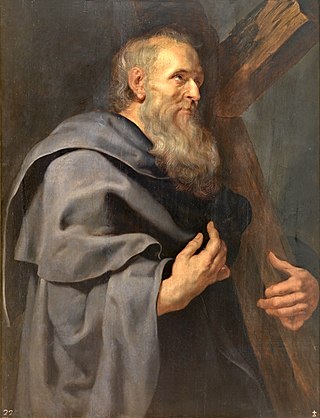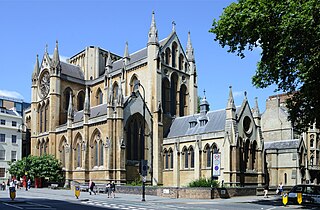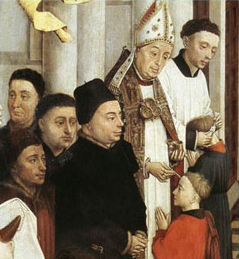Church of the Holy Apostles or Church of the Twelve Apostles may refer to:
The Apostles' Creed, sometimes titled the Apostolic Creed or the Symbol of the Apostles, is a Christian creed or "symbol of faith".
Thomas the Apostle, also known as Didymus, was one of the Twelve Apostles of Jesus according to the New Testament. Thomas is commonly known as "Doubting Thomas" because he initially doubted the resurrection of Jesus Christ when he was told of it ; he later confessed his faith on seeing the wounds left over from the crucifixion.

Matthias was, according to the Acts of the Apostles, chosen by God through the apostles to replace Judas Iscariot following the latter's betrayal of Jesus and his subsequent death. His calling as an apostle is unique, in that his appointment was not made personally by Jesus, who had already ascended into heaven, and it was also made before the descent of the Holy Spirit upon the early Church.

Pentecost is a Christian holiday which takes place on the 50th day after Easter Sunday. It commemorates the descent of the Holy Spirit upon Mary, mother of Jesus and the Apostles of Jesus while they were in Jerusalem celebrating the Feast of Weeks, as described in the Acts of the Apostles. While the Catholic Church believes the Holy Spirit descended upon Mary, this is not recorded in the New Testament.

Philip the Apostle was one of the Twelve Apostles of Jesus according to the New Testament. Later Christian traditions describe Philip as the apostle who preached in Greece, Syria, and Asia-Minor.
In the Latter Day Saint movement, an apostle is a "special witness of the name of Jesus Christ who is sent to teach the principles of salvation to others." In many Latter Day Saint churches, an apostle is a priesthood office of high authority within the church hierarchy. In many churches, apostles may be members of the Quorum of the Twelve and First Presidency of the church. In most Latter Day Saint churches, modern-day apostles are considered to have the same status and authority as the Biblical apostles.

The Church of Jesus Christ is an international Christian religious denomination headquartered in Monongahela, Pennsylvania, United States. Organized at Green Oak, Pennsylvania, U.S.A. in the year 1862. The church is a Christian Restorationist church and accepts the Book of Mormon as scripture. The church considers itself the gospel restored, or the original church and good news as established by Jesus Christ in the New Testament, restored upon the earth. It also claims to be the spiritual successor to the Church of Christ, organized by Joseph Smith on April 6, 1830. The church sees Sidney Rigdon as Smith's rightful successor following the assassination of Smith because Rigdon was Smith's first counselor in the First Presidency. The church is not officially affiliated with any other church, organization or denomination.

The Catholic Apostolic Church (CAC), also known as the Irvingian Church or Irvingite Church, is a denomination in the Restorationist branch of Christianity. It originated in Scotland around 1831 and later spread to Germany and the United States. The tradition to which the Catholic Apostolic Church belongs is sometimes referred to as Irvingism or the Irvingian movement after Edward Irving (1792–1834), a clergyman of the Church of Scotland credited with organising the movement.

Jude was one of the Twelve Apostles of Jesus according to the New Testament. He is generally identified as Thaddeus and is also variously called Judas Thaddaeus, Jude Thaddaeus, Jude of James, or Lebbaeus. He is sometimes identified with Jude, the brother of Jesus, but is clearly distinguished from Judas Iscariot, the disciple who betrayed Jesus prior to his crucifixion. Catholic writer Michal Hunt suggests that Judas Thaddaeus became known as Jude after early translators of the New Testament from Greek into English sought to distinguish him from Judas Iscariot and subsequently abbreviated his forename. Most versions of the New Testament in languages other than English and French refer to Judas and Jude by the same name.
Apostolic may refer to:
John Edward Page was an early leader in the Latter Day Saint movement.

The Feast of Saints Peter and Paul or Solemnity of Saints Peter and Paul is a liturgical feast in honor of the martyrdom in Rome of the apostles Saint Peter and Saint Paul, which is observed on 29 June. The celebration is of ancient Christian origin, the date selected being the anniversary of either their death or the translation of their relics.

Confirmation in the Catholic Church is one of the seven sacraments. It is also one of the three sacraments of initiation into the Catholic Church, the other two being Baptism and Holy Communion.
In Mormonism, revelation is communication from God to man. Latter Day Saints teach that the Latter Day Saint movement began with a revelation from God, which began a process of restoring the gospel of Jesus Christ to the earth. Latter Day Saints also teach that revelation is the foundation of the church established by Jesus Christ and that it remains an essential element of his true church today. Continuous revelation provides individual Latter Day Saints with a "testimony", described by Richard Bushman as "one of the most potent words in the Mormon lexicon".

The Greek Orthodox Church of the Holy Apostles, in common use simply Church of the Apostles is the church at the centre of the Greek Orthodox Monastery of the Holy Apostles at Capernaum, standing among the ruins of ancient Capernaum near the shore of the Sea of Galilee in Israel. It is also known as simply the Greek Orthodox church at Capernaum, to differentiate it from the Franciscan monastery standing in the southern part of Capernaum. It is sometimes named as the Church of the Seven Apostles, based on the seven disciples mentioned in John 21, but it is actually dedicated to all the twelve apostles of Jesus.

In Christian theology and ecclesiology, the apostles, particularly the Twelve Apostles, were the primary disciples of Jesus according to the New Testament. During the life and ministry of Jesus in the 1st century AD, the apostles were his closest followers and became the primary teachers of the gospel message of Jesus. There is also an Eastern Christian tradition derived from the Gospel of Luke of there having been as many as seventy apostles during the time of Jesus' ministry.

An apostle, in its literal sense, is an emissary. The word is derived from Ancient Greek ἀπόστολος (apóstolos), literally "one who is sent off", itself derived from the verb ἀποστέλλειν (apostéllein), "to send off". The purpose of such sending off is usually to convey a message, and thus "messenger" is a common alternative translation; other common translations include "ambassador" and "envoy". The term in Ancient Greek also has other related meanings.
Apostle, an anglicization of the Greek ἀπόστολος (apóstolos), refers to a messenger or ambassador.

The President of the Church is the highest office of the Church of Jesus Christ of Latter-day Saints. It was the office held by Joseph Smith, the church's founder. The church's president is its leader and the head of the First Presidency, its highest governing body. Latter-day Saints consider the president of the church to be a "prophet, seer, and revelator" and refer to him as "the Prophet", a title that was originally given to Smith. When the name of the president is used by adherents, it is usually prefaced by the title "President". Russell M. Nelson has been the president since January 14, 2018.